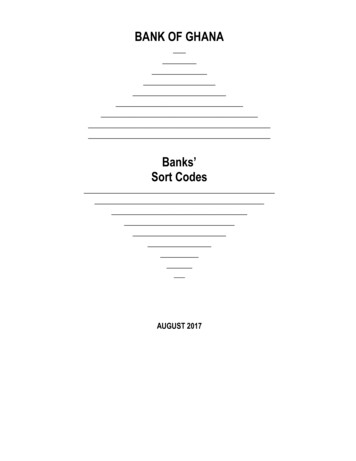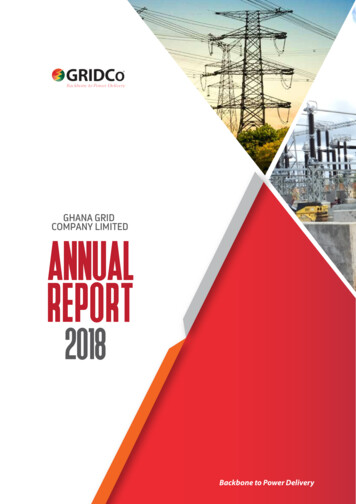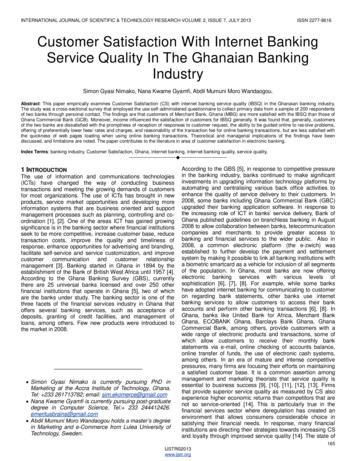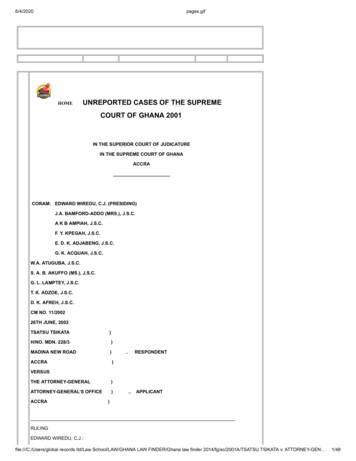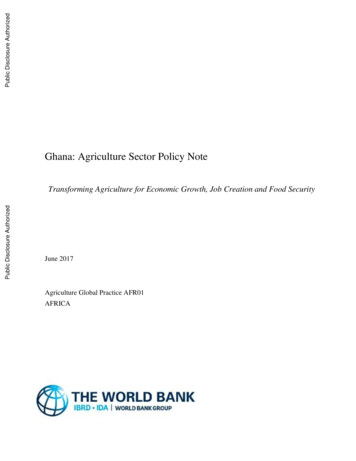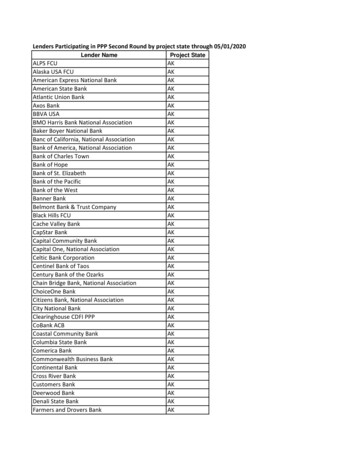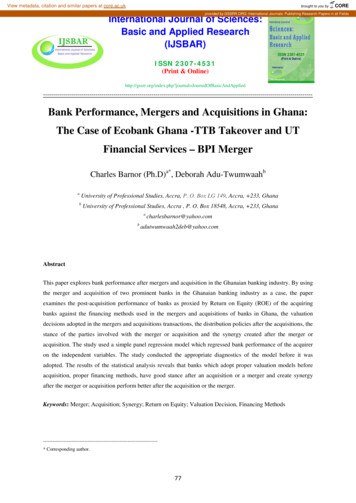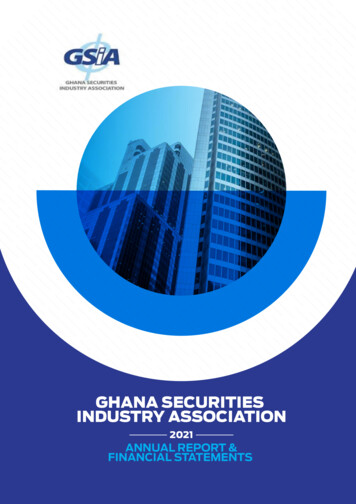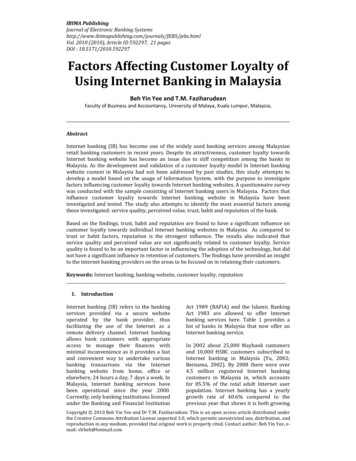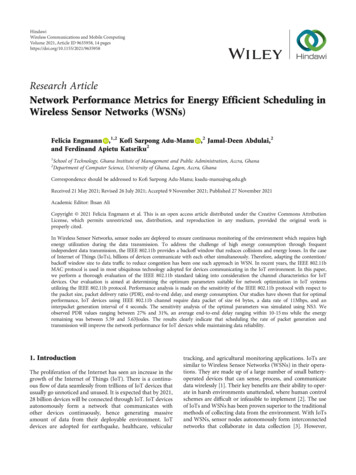
Transcription
Ghana DigitalEconomy DiagnosticSTOCKTAKINGREPORT
Ghana DigitalEconomy DiagnosticSTOCK-TAKINGREPORT
2019 The World Bank Group1818 H Street NW, Washington, DC 20433Telephone: 202-473-1000; Internet: www.worldbankgroup.orgSome rights reserved1 2 3 4 21 20 19 18This work is a product of the staff of The World Bank Group with external contributions. The findings, interpretations, and conclusionsexpressed in this work do not necessarily reflect the views of the World Bank Group, its Board of Executive Directors, or the governments theyrepresent. The World Bank Group does not guarantee the accuracy of the data included in this work. The boundaries, colors, denominations,and other information shown on any map in this work do not imply any judgment on the part of The World Bank concerning the legal statusof any territory or the endorsement or acceptance of such boundaries.Nothing herein shall constitute or be considered to be a limitation upon or waiver of the privileges and immunities of the World Bank Group,all of which are specifically reserved.RIGHTS AND PERMISSIONSThis work is available under the Creative Commons Attribution 3.0 IGO license (CC BY 3.0 . Under the Creative Commons Attribution license, you are free to copy, distribute,transmit, and adapt this work, including for commercial purposes, under the following conditions:ATTRIBUTION—Please cite the work as follows: World Bank Group. 2019. Digital Economy for Ghana Diagnostic Report. Washington, DC:World Bank. License: Creative Commons Attribution CC BY 3.0 IGO.TRANSLATIONS—If you create a translation of this work, please add the following disclaimer along with the attribution: This translation wasnot created by the World Bank Group and should not be considered an official World Bank Group translation. The World Bank Group shallnot be liable for any content or error in this translation.ADAPTATIONS—If you create an adaptation of this work, please add the following disclaimer along with the attribution: This is an adaptationof an original work by the World Bank Group. Views and opinions expressed in the adaptation are the sole responsibility of the author or authorsof the adaptation and are not endorsed by the World Bank Group.THIRD-PARTY CONTENT—The World Bank Group does not necessarily own each component of the content contained within the work. TheWorld Bank Group therefore does not warrant that the use of any third-party-owned individual component or part contained in the work willnot infringe on the rights of those third parties. The risk of claims resulting from such infringement rests solely with you. If you wish to reusea component of the work, it is your responsibility to determine whether permission is needed for that reuse and to obtain permission fromthe copyright owner. Examples of components can include, but are not limited to, tables, figures, or images.All queries on rights and licenses should be addressed to World Bank Publications, The World Bank Group, 1818 H Street NW, Washington,DC 20433, USA; e-mail: pubrights@worldbank.org.Cover and Layout Design: Diego Catto
Table of ContentsAbout DE4A9Acknowledgements13Abbreviations14Executive Summary1. Introduction17271.1 Country at a Glance271.2 Background on the Digital Economy291.3 Rationale for Digital Economy Development321.4 Diagnostic Methodology342. DE4A Foundational Elements372.1 Digital Infrastructure382.2 Digital Platforms442.3 Digital Financial Services572.4 Digital Entrepreneurship702.5 Digital Skills3. Conclusion: A Way Forward8495Notes101References103APPENDIX A. Digital Financial Services109APPENDIX B. List of Main Entrepreneurship Hubs in Ghana115APPENDIX C. Ghana’s Domestic Private Digital Platforms117APPENDIX D. Recommendations to Enhance the Digital Economy in Ghana119TablesTable 0.1. Relevance of the Recommendations to Development Outcomes22Table 1.1. GDP Growth, Poverty Reduction, and Sectoral Drivers28Table 1.2. ICT Sector Employees and Establishments in Ghana (2014)30Table 2.1. Submarine Cables in Ghana (2017)38Table 2.2. Terrestrial Fiber Network39Table 2.3. Telecommunications Infrastructure Indicators across Peer Countries (2017)40Table 2.4. Key Policy and Legislations Related to ICT/Digital Development in Ghana41Table 2.5. A Sample of Ghana’s Digital Services47Table 2.6. Microwork in Africa, Selected Countries51Table 2.7. Volume and Value of MM interoperability, 201863Table 2.8. Ghana Innovation/Entrepreneurship Rankings71Table 2.9. Research Outputs in 201675Table 2.10. Societal Attitudes Towards Entrepreneurship77Table 2.11. Opportunity Framework for Stakeholders93Table 3.1. Relevance of the Recommendations to Development Outcomes96Table 3.2. Recommendations Supporting Digital Firms and Job Creation98Table 3.3. Recommendations Supporting Expansion of Digital Services99Table 3.4. Recommendations Supporting Efficiency and Quality of Services100Table A.1. Government, Business, and People Payments, 2016110Table A.2. Annual Value and Volume of Payment Transactions by Debit, Credit, and Prepaid Cards112Table A.3. Government, Business, and People Payments Breakdown, 2016113
BoxesBox 2.1. Jumia – African e-Commerce Platform53Box 2.2. Training and Support to Increase Online Presence of Ghanaian Products and Services53Box 2.3. Rural e-Commerce Development in China, Taobao Villages57Box 2.4. Accra Digital Center Offers Ready-to-Go Space for Digital Businesses71Box 2.5. Meltwater Entrepreneurial School of Technology (MEST)72Box 2.6. Ashesi University’s Model for Providing Practical Digital Entrepreneurship Skills74Box 2.7. Google AI Research Center75Box 2.8. Digital Skills84FiguresFigure 0.1. Government Initiatives that Support Digital Entrepreneurship in Ghana20Figure 0.2. Theory of Change Towards a Digital Economy in Ghana22Figure 0.3. Recommendations Supporting Digital Firms and Job Creation23Figure 0.4 Recommendations Supporting Expansion of Digital Services24Figure 0.5. Recommendations Supporting Efficiency and Quality of Services25Figure 1.1. Representation of a Digital Economy29Figure 1.2. Growth in Ghana’s ICT Sector30Figure 1.3. Digital Economy Can Bring Shared Prosperity and Reduced Poverty33Figure 1.4. Approach to Stocktaking of Ghana’s Digital Economy35Figure 2.1. UN E-Government Index across Peer Countries44Figure 2.2. Private Digital Platforms Operating in Ghana and Selected African Countries50Figure 2.3. Digital Commerce Rankings, Selected African Countries52Figure 2.4. Ownership of Accounts (2014 and 2017)59Figure 2.5. Value and Volume of Payment Transactions per Payment Instrument 201760Figure 2.6. Annual Active MM Accounts, Active MM Agents and Volume of MM Transactions62Figure 2.7. Financial Inclusion by Account Type, 2014 versus 201764Figure 2.8. Mobile Money Account Use by Population Segment, 2014 versus 201765Figure 2.9. Mobile Money Use, 2014 versus 201765Figure 2.10. Tech Ecosystem Outlook, Q2 201973Figure 2.11. Monthly Commercial Property Rent per Square Meter ( )73Figure 2.12. Financial Market Development Across Countries79Figure 2.13. Government Initiatives that Support Digital Entrepreneurship in Ghana80Figure 2.14. Significance of Skills Required in the Future Workforce, by Market85Figure 2.15. Internet Access in Schools86Figure 2.16. Quality of Education86Figure 2.17. Cumulative Demand for Digital Skills Training in Ghana, by Level of Skill, 2018-203087Figure 2.18. Significance of Digital Skills Needed in the Workforce, All Markets88Figure 2.19. eLearning market89Figure 2.20. Skills Affordability90Figure 2.21. Recruitment of Employees with Digital Skills in Ghana91Figure 2.22. Responses: Will Undersupply of Digital Skills Constrain Expected Growth in the Economy91Figure 3.1 Theory of Change Towards a Digital Economy in Ghana97Figure A.1. Annual Value and Volume of Payment Transactions through E-zwich and National Switch111
AboutDE4ARapid digital transformation is reshaping our global economy,permeating virtually every sector and aspect of daily life,changing the way we learn, work, trade, socialize, and accesspublic and private services and information. In 2016, the globaldigital economy was worth some 11.5 trillion, equivalent to 15.5percent of the world’s overall GDP. It is expected to reach 25 percentin less than a decade, quickly outpacing the growth of the overalleconomy (Huawei and Oxford Economics, 2016). However, countrieslike Ghana are currently capturing only a fraction of this growth andneed to strategically invest in the foundational elements of theirdigital economy to keep pace.9
The Digital Economy for Africa (DE4A) Initiative forms part of the World Bank Group’s support for the African Union’s Digitaltransformation for Africa, which aims for every African individual, business and government to be digitally enabled by 2030. TheDigital Economy for Africa initiative is underpinned by five VEHOMEGROWNCOLLABORATIVETaking an ecosystemAiming at a veryA digital economy forBased on Africa’sDealing with the digitalapproach that looks atdifferent scale of“everyone, in everyrealities andeconomy requiressupply and demandambition beyondplace, and at all times”unleashing the Africana different flexibleand defies a narrowincremental “islands”creating equal accessspirit of enterprise to“mindset,” collaboratingsilo approach inof success.to opportunities andhave more homegrownamong countries, sectors,defining the digitaldealing with risksdigital contentand public and privateeconomy elementsof exclusions.and solutions.players.and foundations.For a successful and inclusive digital economy, African countries need to build key foundational elements of a digital economy (seefigure A). These foundations, or pillars, which are synergistic and require the use of public and private sector solutions, are the MSDIGITAL LLSDigital infrastructureDigital platforms offerDigital financial servicesDigital entrepreneurshipEconomies requireprovides the way forproducts and services,enable individualsand innovation createa digitally literatepeople, businesses,accessible throughand businesses toan ecosystem to bringworkforce in order toand governments todigital channels, suchconduct transactionsthe digital economy tobuild robust digitalget online, and linkas mobile devices,electronically or onlinelife, with new, growth-economies andwith local and globalcomputers, and theand open a pathway to aoriented ventures,competitive markets.digital services, thusInternet, for all aspectsrange of digital financialand transformation ofDigital skills constituteconnecting themof life. Digital platformsservices in additionexisting businesses,technology skills,to the global digitalenable producers andto digital payments,contributing to nettogether with businesseconomy. For theusers to create valueincluding credit,employment growthskills for building ordigital economy,by interacting with eachsavings, and insurance.and helping enhancerunning a startup orgood and affordableother. GovernmentsAccess to affordablecompetitivenessenterprise. GreaterInternet connectivityoperate digital platformsand appropriateand productivity ofdigital literacy furtheris a critical foundation.to offer citizen-facingdigital financialan economy.enhances adoption andgovernment servicesservices is criticaluse of digital productsand share information.for the participationand services amongstCommercial firms alsoof individuals andthe larger population.operate digital platformsbusinesses in theto offer a growing array ofdigital economy.products and services.10
FIGURE A:KEY COMPONENTS OF THE DIGITAL ECONOMY ECOSYSTEMMacro-economic stabilityFinancial sector stability and integrityEnabling Tax policyEnabling Trade policyCROSS CUTTING AREAS Data Privacy & Cybersecurity CompetitionGender USAGEE-COMMERCEOPEN BANKING: non banks offer tailored servicesDATA LOCKERS to access selected servicesDIGITALPLATFORMS APPLICATIONS LIKELY TO DEVELOP ONCE THEFOUNDATION ELEMENTS ARE IN PLACE:DIGITALSKILLS ANDLITERACYMACROECONOMICENABLING ENVIRONMENTDIGITALENTREPRENEURSHIPAND INNOVATIONDIGITAL FINANCIALSERVICESDIGITALINFRASTRUCTUREFoundation elements11
AcknowledgementsThis report was prepared by a team from the World Bank Group,including Eva Clemente Miranda (Private Sector Specialist, GFCAS),Michael Ehst (Senior Private Sector Specialist, GFCFE), Tim Kelly(Lead Digital Development Specialist, GDD11), Doreen Oppan (SeniorFinancial Sector Specialist, GFCA2), Jana Kunicova (Senior PublicSector Specialist, GGOAS), Max William Mattern (Financial SectorSpecialist, GGE), Kaoru Kimura (Digital Development Specialist,GDD11), Ander Alcalde Odriozola (Financial Sector Analyst, GFCAS),Claudia Ivette Garcia Romero (Digital Economy Consultant, GFCAS),Daniel Enrique Querejazu (Digital Entrepreneurship Consultant,GFCFE), and Minita Mary Varghese (Digital Financial Services andDigital Economy Consultant, GFCAS); henceforth referred to as theCore Team.Additional guidance and contributions were provided by DouglasPearce (Practice Manager GFCAS), Carlos Leon Vicente (SeniorFinancial Sector Specialist, GFCAS), Cristian Quijada (Senior PrivateSector Specialist, GFCAS), and Mavis Ampah (Digital DevelopmentConsultant, GDD11). Moreover, the report has benefitted fromfeedback received by Eric D. Manes (Senior Economist, GFCAS),Laurent Gonnet (Lead Financial Sector Specialist, GFCAW),Tiago Carneiro Peixoto (Senior Public Sector Specialist, GGOAC),Seth Ayers (Senior Program Officer, GDD12), and Eliana Kaloshi(Operations Officer, CTTDR). The team also thanks Bill and MelindaGates Foundations for their contribution to the DFS foundation underthe overall DE4A framework.13
Abbreviations14ACHAutomated clearing houseAPIApplication Programming InterfaceATMAutomated teller machineB2BBusiness to businessB2GBusiness to governmentB2PBusiness to personBPOBusiness process outsourcingBoGBank of GhanaBTCABetter than Cash AllianceC2GCitizen to governmentCAGController & Accountant GeneralCSOCivil society organizationDE4ADigital Economy for AfricaDEMIsDedicated Electronic Money IssuersDFSDigital financial servicesDPAData protection agencyDSTVDigital satellite televisionECICsEnhanced Community Information CentersEDRExternal dispute resolutionEGDIE-Government Development IndexEMIE-money issuersFCPFinancial consumer protectionFDIForeign direct investmentFIFinancial institutionG2BGovernment to businessG2CGovernment to citizenG2GGovernment to governmentG2PGovernment to personGACHGhana Automated Clearing HouseGDPGross domestic productGEPPGhana E-Payment PortalGhIPSSGhana Interbank Payment and Settlement SystemsGIFECGhana Investment Fund for Electronic CommunicationsGIPGhana Interbank Payment and Settlement Systems Instant PayGIPCGhana Investment Promotion CentreGoGGovernment of GhanaGPSGlobal positioning systemGRAGhana Revenue AuthorityGSAGhana Standards AuthorityGSGDAGhana Shared Growth and Development AgendaGSMAGlobal System for Mobile Communications AssociationGSSGhana Statistical ServiceHCIHuman Capital IndexICTInformation and communications technology
IDIdentity documentIDRInternal dispute resolutionIoTInternet of ThingsITInformation technologyIteSIT-enabled ServicesKYCKnow-your-customerLEAPLivelihood Empowerment against PovertyM&EMonitoring and evaluationMDAMinistries, departments and agenciesMMMobile moneyMMDAMetropolitan, municipal and district assembliesMMIMobile money interoperabilityMNOMobile network operatorMoCMinistry of CommunicationsMSMEMicro, small and medium enterpriseMTNMobile telephone networkNBFINonbank financial institutionNCANational Communication AuthorityNCSPSNational Cybersecurity Policy and StrategyNEIPNational Entrepreneurship and Innovation ProgrammeNFCNear field communicationNFIDSNational Financial Inclusion and Development StrategyNISNational Identification SystemNITANational Information Technology AgencyNQINational Quality InfrastructureNSSNational Service SchemeNYANational Youth AuthorityOSIOnline Service IndexOTTOver-the-topP2BPerson to businessP2GPerson to governmentP2PPerson to personPEPrivate equityPOSPoint of salePSSBPayment Services and Systems BillQRQuick ResponseR&DResearch and developmentRGDRegistrar General’s DepartmentRTGSReal-Time Gross SettlementSCDSystematic Country DiagnosticSIMSubscriber identity moduleSMESmall and medium enterprisesTBILL4ALLTreasury Bills for AllTIITelecommunication Infrastructure IndexTINTax Identification NumberUSSDUnstructured Supplementary Service DataVASValue-added serviceVCVenture capitalWDRWorld Development ReportYEAYouth Employment Agency15
cationofdigitaltechnologies are expected to characterize economies of thefuture, shaping their ability to succeed in the global marketplaceand offer a better quality of life for their citizens. Disruptivetechnologies are already altering traditional business models andpathways to development, yielding significant gains, increasedconvenience, as well as supporting better access to services forconsumers. In 2016, the digital economy was worth an estimated 11.5 trillion worldwide, equivalent to 15.5 percent of global GDP. It isforecast to reach 25 percent in less than a decade, far outpacing thegrowth of the “traditional” economy (Huawei and Oxford Economics2016). Mobile money is driving financial inclusion, particularly in SubSaharan Africa, with the number of accounts doubling to 21 percentbetween 2014-17. African e-commerce is also rapidly growing, at anestimated annual rate of 40 percent. Over the past five years, therehas been a tenfold increase across the region in the supply of newintermediaries such as incubators, accelerators, and technologyhubs, amongst others, numbering more than 400 across Africatoday. The digital economy in Africa is expected to grow to over 300 billion by 2025 (McKinsey 2013).17
Amid this promise, the digital economy also introduces newGhana, (ii) bridge the urban-rural divide by expanding digital serviceschallenges and risks including a growing digital divide, riskto rural and underserved communities, and (iii) leverage ICT to: (a)of cyber-attacks and fraud, threats to privacy, and disruptionincrease efficiency, improve citizen experience and engagementto markets. Access to the Internet remains out of reach for mostwith government by reducing the mean time to deliver governmentpeople, too few citizens have digital IDs or transaction accountsservices to citizens; (b) increase transparency in government functions;– locking them out of access to critical public services, financialand (c) increase government revenue generation.inclusion, and markets. Digital startups struggle to attract fundingand traditional businesses are only slowly adopting digitalGhana’s ability to position itself as a leading digital innovationtechnologies and platforms to boost productivity and sales. Fewhub will depend to a large extent on its ability to address risksinterventions are investing strategically and systematically inand it needs to strategically invest in the foundational elementsdeveloping digital infrastructure, data frameworks, platforms, skills,of its digital economy. A holistic approach to digital economyand entrepreneurship.development is necessary to maximize Ghana’s chance for attainingits digital potential. Rather than implementing multiple, fragmentedGhana’s economy is led by the services sector, with informationinterventions, a coordinated and high-level crossboundary approachand communications technology (ICT) contributing about 3.6that maximizes complementarities is needed to build an inclusivepercent of the country’s GDP, telecommunication services beingdigital economy – to ultimately spur the development of high-the main one. The contribution of Ghana’s ICT sector to the overallimpact applications for health, education, e-commerce, agriculture,GDP of the country has grown steadily over the years, becoming oneand social service delivery, among others, while mitigating exclusion,of the best performing sectors in the country’s economy. In 2017,fraud, and cyber risks.the contribution of ICT services was 1.7 billion, or 3.6 percent ofthe overall GDP of Ghana. The combination of a competitive marketGhana’s telecommunication sector has experienced impressivestructure, an improved international connectivity, an increase ingrowth, thanks to early liberalization and deregulation of theprivate sector investment, and a reduction in telecommunicationsmarket since the late 1990s. Strong competition has resulted inprices, in particular at the wholesale level, has been instrumentalnear ubiquitous mobile coverage and a high mobile penetrationin fueling innovation and investments in the broader ICT sector,rate of 131 SIM cards per 100 inhabitants, compared to an average ofincluding in IT and IT-enabled Services (ITeS). A vibrant IT sector is80 in the rest of Africa (GSMA 2018a). The country’s mobile Internetemerging with companies such as mPedigree, Rancard, Softtribe,penetration of about 68 percent is notable, albeit only slightly aboveHubtel, mPharma, Logiciel, Nosmay competing globally in softwarethe Africa regional average (GSMA 2018a).and applications platforms for everything from finance and paymentsto agriculture and medical services.More needs to be done to create a more comprehensive, robust,secure and redundant nationwide network and to make Ghana’sThe Government of Ghana (GoG) is making significant efforts anddigital economy more competitive. Most of the infrastructure isinvestments that are expected to position the country as a regionalconcentrated in urban and commercial areas with large sections ofhub for digital services. The current government recognizesthe country’s rural areas without effective coverage. Internet costthe opportunity that digital development has for stimulating jobs,remains high and access low, especially in rural areas. Providingimproving productivity, and accelerating inclusive growth, andreliable and fast broadband connectivity for ministries, departments,has pledged to put digital economic transformation at the centerand agencies (MDAs), and metropolitan, municipal, and districtof the country’s Ghana Beyond Aid agenda. The governmentassemblies (MMDAs) across the country is still a challenge. In theis also undertaking a number of keystone projects including aabsence of a more robust and comprehensive nationwide fibercomprehensive digital address system, which is essential for digitalbackbone, operators have been investing in parallel wirelesscommerce, and more aggressive automation of governmentsolutions to extend 3G service to key parts of the country. Similarly,business processes. These efforts are being complemented by aGhana needs to unfold a cyber-conscious culture across themore proactive signaling to the international tech community thateconomy, particularly in financial institutions and SMEs, with athe country is open for business, including, for instance, the visit ofnational program that raises awareness of cybersecurity risks anda group of Ghanaian technology companies in April 2018 to engagesecure online behavior.counterparts in Silicon Valley led by the Vice President.The growing desire to achieve greater efficiency, transparencyAs part of Ghana Beyond Aid, the government aims now to developand accountability has led to the government’s continueda digital strategy and an implementation plan to establish Ghana asinvestment in public sector digital platforms. A number of digitalthe leader in ICT innovation in Sub-Saharan Africa by 2023. It aims toplatforms have been developed in an effort to improve governance(i) foster the growth of the local IT industry beyond the boundaries ofand delivery of public services, including a digital address system,18
e-procurement, e-immigration, e-parliament, and e-judiciary. Thewide payments infrastructure by 2030. Complementing the NFIDS,government has just begun the rollout of the much-anticipatedthe Government of Ghana is working concurrently on a Nationaldigital identification program (the Ghana Card). If the roll-out isDigital Financial Services Policy, which is currently being drafted bysuccessful, and take-up is widespread, it could be a critical first stepthe Ministry of Finance and the Bank of Ghana. The DFS policy isto citizens’ access to services including through online platforms. Inexpected to outline the government’s vision for the country movingthis way, in the 2018 survey of the UN E-Government Index, Ghanainto the next decade, including that (i) a majority of Ghanaians willis the only African country that transitioned from the middle to highhave secure access to a broad range of suitable and affordableE-Government Development Index (EGDI) level.digital financial services, and (ii) business and government will haveachieved greater transparency and efficiency to contribute to theNevertheless, a number of challenges exist that affect theequitable economic growth of the nation.government’s ability to operate digitally. Trust in e-services offeredby the government is generally low and the majority of GhanaiansGhana has made substantial progress on financial inclusion, dueare not even aware that e-government services exist. The Nationalin large part to growth in DFS. According to the World Bank’s GlobalInformation Technology Agency (NITA), as the key player in drivingFindex, the share of Ghanaian adults (over 15 years of age) with athe digital transformation of the public sector in Ghana, does notformal financial account increased by 42 percent between 2014 andhave sufficient institutional capacity nor funding for implementation2015. As a result, nearly 6 in 10 adults had formal access in 2017. Withof the ambitious digital government platforms that the governmentmobile account ownership increasing by nearly 200 percent betweenenvisions. As a result, MDAs suffer from a chronic lack of connectivity,2014 and 2017, mobile money has become the preferred paymentand dysfunctional e-mail, websites, and other basic services. Therealternative to cash when measured in terms of transaction volumes.is also a need to strengthen data protection expertise to protectIn May 2018, the Bank of Ghana mandated that all mobile moneypersonal data.providers connect to GHLink, with full interoperability betweenmobile money providers and banks introduced in December 2018.Ghana ranks third in Africa in private digital platforms, after Nigeriaand South Africa (Insight2Impact 2019). Digital platforms in GhanaDespite robust electronic payment infrastructure, Ghana remainsare transforming the provision of services, particularly in the retail,a cash-based economy. 98.72 percent of payments by volume aretransportation, and accommodation sectors. Microwork platforms arestill in cash and the main noncash instrument continues to be checks.becoming a source of jobs (1 percent of Internet users in the countryThe current extensive use of cash in Ghana among individuals can beare microwork users, reaching almost 80,000 in 2017 and mainlyexplained by the high cost of digital payments that is often passedused by women and young people). Digital commerce is ramping up,on to users, trust issues with using digital payments, low penetrationpositioning Ghana as the sixth country in Africa in B2C E-commerceof debit and credit cards, and low availability of POS devices atin 2018, climbing six positions from its 2017 ranking. The governmentmerchant points. Moreover, without business rules in place to governis providing training and support to increase online presence ofpricing and other aspects of the scheme, many providers haveGhanaian products and services, including initiatives such as Ghanaeffectively discouraged their customers from sending money off-netOnline Mall, Digital Marketing, and Made in Ghana Mall.by increasing the fees for these transactions. As a result, interoperabletransactions remain just a fraction of overall transactions. Additionally,However, there are a number of challenges and risks for thefinancial technology firms (fintechs) are not yet connected to GHLinkexpansion of the platform economy in Ghana. First, differentand there are no clear rules governing participation in the scheme.ministries, departments, and agencies, lead initiatives often withparallel and overlapping activities, and therefore there is a needEntrepreneurship support policies, programs, and actors infor coordination and streamlining of programs. Platform diffusionGhana are growing at a rapid pace, but the country still lags manyremains low, as only 28 percent of domestic firms have a website andof its regional peers in terms of ecosystem maturity. Ghanaianonly 7.8 percent of people perform online transactions. The deliveryentrepreneurs still face many challenges that threaten their abilityof high quality and standardized products and services to local andto start and grow viable businesses. However, despite theseinternational markets is a challenge for most Ghanaian companies.challenges, Ghana has many of the core components and resourcesneeded for a successful entrepreneurship ecosystem that can helpRecognizing the importance of catalyzing greater innovation inachieve its long-term strategic vision of becoming a middle-incomeand adoption of digital financial services (DFS), the Governmentcountry and building an economy capable of providing good jobsof Ghana has adopted a National Financial Inclusion andthat are suitable and sustainable for development. Political stability,Development Strategy (NFIDS) 2017‐2023. The NFIDS commitsan influential diaspora, and strong Internet connectivity are somethe government to priorities that will serve as important stepsof the factors that work in Ghana’s favor toward creating a ripetowards achieving universal access to DFS and creating the Africa-ecosystem for entrepreneurship.19
Like many Sub-Saha
Training and Support to Increase Online Presence of Ghanaian Products and Services 53 Box 2.3. Rural e-Commerce Development in China, Taobao Villages 57 Box 2.4. Accra Digital Center Offers Ready-to-Go Space for Digital Businesses 71 Box 2.5. Meltwater Entrepreneurial School of Technology (MEST) 72 Box 2.6. Ashesi University's Model for Providing Practical Digital Entrepreneurship Skills 74 .
